Uncategorized
Congressional Report: Environmental Causes of Breast Cancer Must be Researched
 "Most cases of breast cancer “occur in people with no family history,” suggesting that “environmental factors — broadly defined — must play a major role in the etiology of the disease.” That's the conclusion of something called the Interagency Breast Cancer and Environmental Research Coordinating Committee, which came out with a report last week.
"Most cases of breast cancer “occur in people with no family history,” suggesting that “environmental factors — broadly defined — must play a major role in the etiology of the disease.” That's the conclusion of something called the Interagency Breast Cancer and Environmental Research Coordinating Committee, which came out with a report last week.
In 2012, Breast cancer was diagnosed in 227,000 women, killed 40,000, and cost more than $17 billion to treat in the United States.
Yet only a fraction of federal research funding has gone toward examining links between breast cancer and ubiquitous chemicals such as the plastic hardening agent bisphenol A; the herbicide atrazine; and dioxin, a byproduct of plastics manufacturing and burning, says the report, prepared for Health and Human Services Secretary Kathleen Sebelius.
“National survey data show that many of these chemicals are present in the blood or urine of children and adults in the United States, and some EDCs are present in 100 percent of the people sampled. Exposure to such compounds early in life can be especially dangerous, the report says.
All told, some 84,000 chemicals are registered for use in the United States. But complete toxicological screening data are available for only 7 percent of these substances, says the report, which calls for “enhanced testing of chemicals, especially classes of chemicals combined together as a mixture, for effects on the mammary gland and breast …”
“Prevention needs to be as important as other investments that are made in screening, treatment and access to care,” Jeanne Rizzo, co-chair of the committee and president of the San Francisco-based Breast Cancer Fund said in an interview. “There really is a problem, and until we address it we’re going to continue to have a quarter of a million new cases every year.”
The report’s release comes three months after a Center for Public Integrity article detailing a study of female plastic automotive parts workers in Windsor, Ontario. That study found that women employed in the chemical-intensive industry were nearly five times as likely to develop breast cancer, prior to menopause, as women in a control group.
“That was essentially an uncontrolled human study,” Rizzo said of the Windsor workers. “We can’t do that. We need to learn from animal studies.”
In the United States, an estimated 150,000 female workers in the plastics and synthetic rubber industries are likely exposed to many of the same chemicals as the women in Windsor, including polyvinyl chloride, or PVC, plastic; acrylonitrile; formaldehyde and styrene.
At least 216 chemicals, including endocrine-disrupting substances like bisphenol A, have been associated with mammary gland tumors in animals. Endocrine-disrupting chemicals, or EDCs, are used to make plastics and pesticides and found in products such as furniture, metal food cans and cosmetics.
But environmental exposures have gotten relatively little attention from researchers.
The National Institutes of Health spent almost $2.4 billion on 2,910 breast cancer research projects from fiscal year 2008 through fiscal year 2010. But only about 27 percent of these projects had to do with prevention, and just 10 percent could be considered “environmental health research.”
Of the $2.8 billion appropriated by Congress from 1992 through 2012 for the Department of Defense Breast Cancer Research Program, 75 percent went toward “basic biology and treatment research, with only 3 percent for prevention and cancer control projects."
The committee recommends that researchers prioritize “chemicals that are produced in high volumes for which there is biologically plausible evidence of their role in the development of breast cancer.”
It also suggests that regulators improve oversight of “cosmetics and personal care products as well as household cleaning and food containment products,” and step up environmental monitoring, especially of “underserved and under-researched groups as well as ‘fenceline’ communities that are in close proximity to industry or waste sites.”
Study Links Hearing Loss to Low Levels of Lead and Camium Exposure
 Exposure to extremely low levels of Lead and Cadmium can lead to hearing loss of up to 20% according to a new study published on Monday.
Exposure to extremely low levels of Lead and Cadmium can lead to hearing loss of up to 20% according to a new study published on Monday.
"The metal levels found to influence hearing were below national workplace standards set by the Occupational Safety and Health Administration. Although the study does not establish causality, the results support previous animal and humans studies that link these heavy metals to hearing loss.
Animal studies show lead and cadmium have a wide array of toxic effects on the hearing system. Both can affect the inner ear where sound is received and sent on to the brain.
Human studies are limited, but exposure to high levels of lead has been linked to hearing loss in children and males exposed at work. Studies in teens have also linked cadmium exposure to hearing loss."
Lead is used in electronics and ammunition, and of course can be found in the fallout of lead smelters like the one in Frisco that Exide Corporation operated until recently. In the United States, the most common sources are old building with lead-based paint, contaminated soil, household dust and drinking water.
Cadmium is widely used in batteries, paint pigments and metal plating. It's also a by-product of ore smelting and released in the air from the burning of fossil fuels. Most people are exposed to cadmium through diet, air pollution and smoking.
Hearing was tested at sound frequencies of normal speech so a loss could make it harder to hear conversations. Lead and cadmium were measured in blood samples.
When lead levels were higher, so were cadmium levels. Higher levels of the metals either alone or together related to more hearing loss, especially in older adults.
Adults with the highest lead and cadmium exposures had more hearing loss. Lead levels above 2.8 micrograms per deciliter of blood related to an 18.6 percent rise in PTA and cadmium levels above 0.8 micrograms per liter had a 13.8 percent increase in PTA.
The CDC recently recommended an "action level" of lead in blood of 5 micrograms per deciliter based on the last decade of research, most of which suggests there is no safe level of exposure to lead. This study certainly points in that direction.
Despite banning lead from gasoline and paint, ongoing testing shows that the average concentration of lead in the American bloodstream is still two orders of magnitude higher than natural human levels.
They’re Not Asking Your Permission
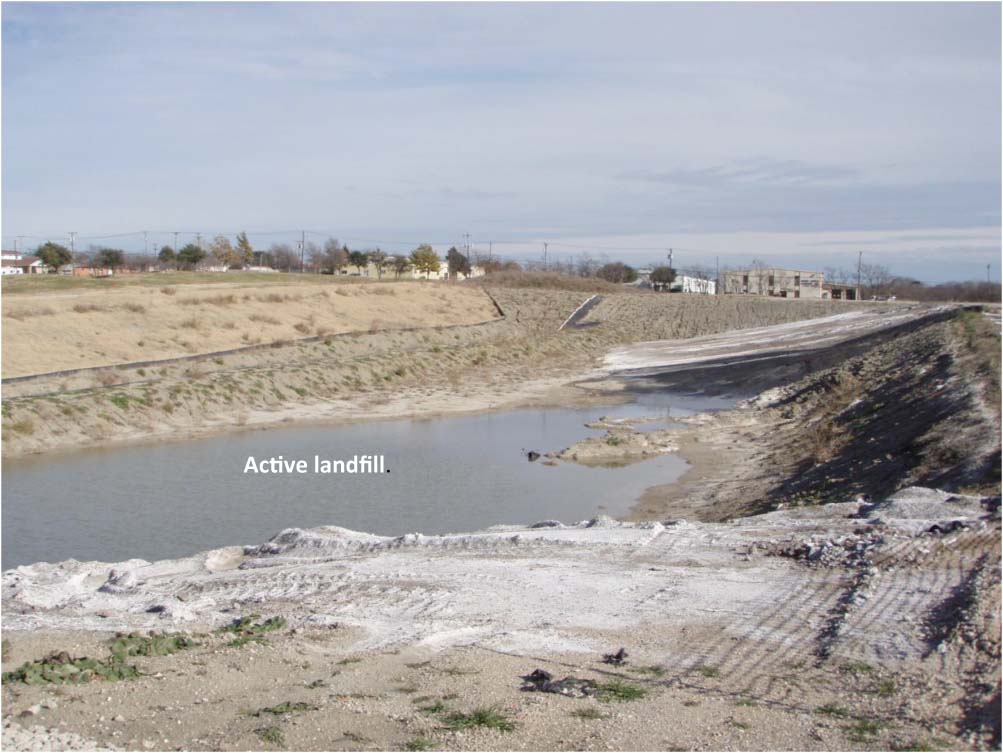 Exide and the State are planning Frisco's future without it's residents.
Exide and the State are planning Frisco's future without it's residents.
This Wednesday night may be one of the few times they can object in person.
Plans are proceeding for Exide to leave landfills full of its lead smelter waste in Frisco….forever
Landfills of lead on the edge of downtown that will pose a constant public health threat and economic dead zone
Landfills of lead along the banks of Stewart Creek as it flows downstream into the City's new "Grand Park"
Join us in saying no to their lead-filled future of Frisco.
Exide's Public Meeting on their lead smelter "Clean-up"
THIS WEDNESDAY NIGHT
7:00 pm
Frisco Depot
6499 Paige Street
(in the Historic District by Babe's)
Whether Frisco residents like it or not, Exide and the State of Texas are deciding to let millions of pounds of lead waste stay buried in Frisco forever – and the current City Council isn't trying to stop them.
While the city bought the less-contaminated outer ring of the Exide lead smelter, the most toxic part of the facility is still owned by Exide.
The City of Frisco has said that it won't interfere in the way the company and state decide to handle the tons of lead waste buried in this area, which stretches from Stewart Creek to the edge of downtown.
Exide, the state, and this city council are all deciding that it's easier just to leave lead contamination permanently buried in place in the middle of Frisco instead of moving it away from people and flowing water.
If citizens don't show up and fight back against these plans, Frisco residents will be dealing with lead contamination issues for decades – just like other communities that didn't have their lead smelter waste cleaned-up completely either.
A former Exide smelter site still sits abandoned in Dallas, some two decades after it closed, surrounded by monitoring wells and a chain link fence. We can't let that happen here.
Many residents sent e-mails to Exide last week saying they wanted a complete clean-up of its lead waste in Frisco. Now they need to come in person with the same message.
Frisco residents have to stand up for their home and community. Nobody at Exide or in government is.
Dallas City Hall: 17 Tons of Air Pollution Too Much for Kids, 75 Tons Just Right
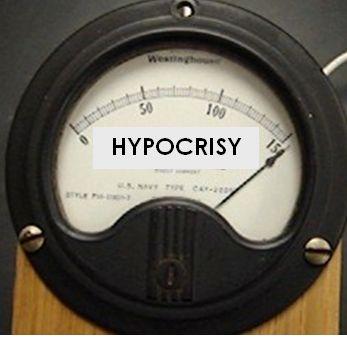 It just keeps getting more ridiculous and indefensible.
It just keeps getting more ridiculous and indefensible.
Just four short months ago, the City of Dallas staff stood up to the big bad Weir Brothers asphalt and concrete crushing plant across the street from the City's new Elm Fork soccer complex with its 15 playing fields, tracks and concession stands. They told the City Council that the crusher was an "incompatible use" next to such a new jewel in the city's park system. Industrialization in that part of town was not consistent with the goals of the City's Comprehensive Plan. The Parks and Recreation Department weighed in, saying that the facility was "will have a negative impact on the soccer complex and possibly hinder future redevelopment in the area." The Office of Environmental Quality was concerned about the particulate matter pollution and the health of children playing at the complex, and also urged denial of a new operating permit.
After that presentation, Councilmember Sheffie Kadane exclaimed that, by Gosh, "We're gonna have kids from all over the world coming to that complex, and we don't want that next door."
Examination of the permit for the Weir Brothers facility shows that total emissions were estimated to be 16.5 tons per year, including the 3 tons a year of Particulate Matter that the Office of Environmental Quality was so concerned about. There was no testimony by staff that the crusher exceeded its permitted emisisons, or could not meet TCEQ emissions limits, or that meeting those limits was safe or not safe. The city was just doing its duty to protect its kids form pollution. ANY pollution that close to such a huge playground for children was just wrong.
Which is why it's so interesting now to see City of Dallas staff say that 75 tons of air pollution a year from approximately the same site near the soccer complex by way of the proposed Elm Fork Refinery is NO PROBLEM AT ALL.
And that's Trinity East own guesstimate about annual emissions. The permit they get from the state allows them to go up to 600 tons per year.
That's right, the City of Dallas rejected the permit of a concrete crusher next to the soccer fields, but is endorsing the permit for a gas refinery that sits next door to the crusher.
Nothing shows the hypocrisy of City Hall over the Trinity East gas leases like this abuse of power by staff to arbitrarily declare one source of minor pollution a nuisance that must be stopped in 2012, while declaring that a source that will emit more than four times the amount of pollution is fine and dandy.
Where is staff's claim of the "incompatible use" of a refinery adjacent to a children's soccer field?
Where is staff's opposition based on the City Comprehensive Plan, which calls for office building not refineries, near the soccer fields.
Where is the Parks and Rec department's indignation over imperiling the success of the soccer field?
Where is the Office of Environmental Quality's concern for the health of children over 75 tons of air pollution and much more than 3 tons a year of Particulate Matter?
Where's the concern over not just PM pollution, but carcinoigens like Benzene and Formaldehyde, wafting into the games acrosss the street? What about dangerous Hydrogen Sulfide emissions?
How can it be that Dallas City Hall can get so worked up about 16. 5 tons of air pollution a year, but be so quiet when it comes to 75 tons of air pollution from the same place? That's a really, really good question that nobody at City Hall seems able to want to answer out loud in public.
Just Say No to Lead Landfills Left in Frisco
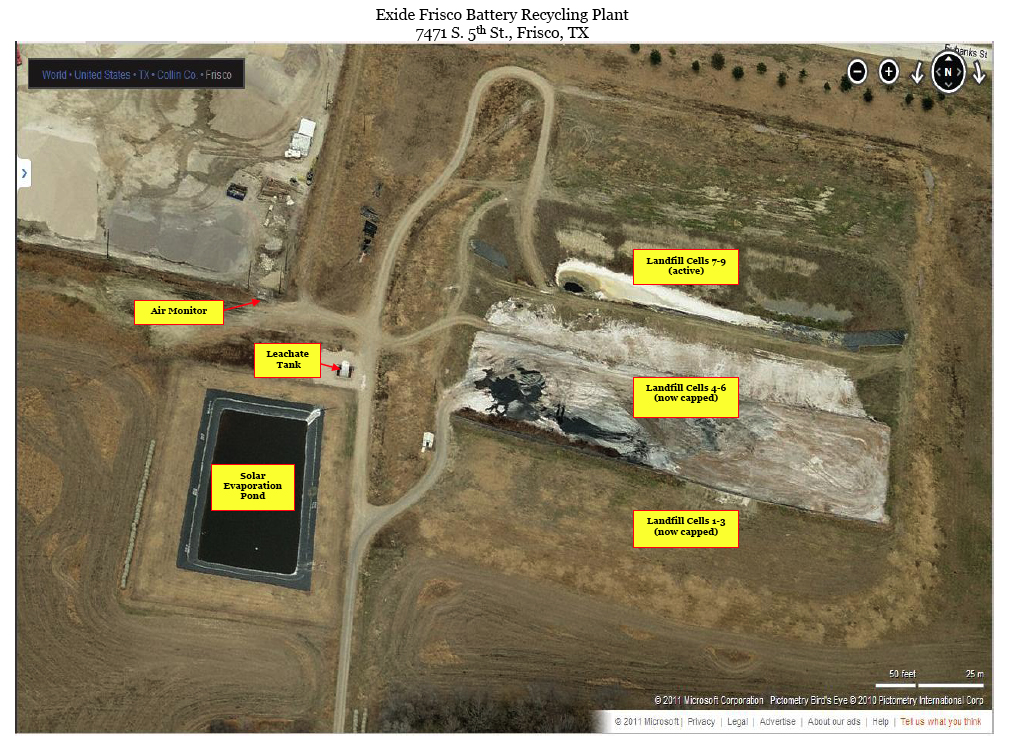 (This release was sent out at 9 am Monday morning….)
(This release was sent out at 9 am Monday morning….)
Saying they're frustrated with the ineptitude of Exide's public comment procedures concerning its plans to leave landfills of lead behind in Frisco, residents unveiled a system of their own on Monday that will funnel comments directly to the plant manager.
"Exide said they were interested in hearing from Frisco residents about their plans to leave over 9 million pounds of lead-contaminated waste buried in Frisco forever, but then directed everyone to a website that never worked," claimed Colette McCadden, chair of Frisco Unleaded, the local group that campaigned to close down the lead smelter and is now addressing its toxic leftovers. "So we're setting up our own comment system that will let Exide know exactly how we feel."
McCadden said her group had worked with Downwinders at Risk to establish a "No Lead Landfills Left in Frisco" web page where residents could send a prepared statement of opposition to Exide as well as add their own comments. She said they'd asked the company for an e-mail address where they could send public comments, but Exide never provided one. So they're using the e-mail address of the plant manager instead.
"It's clear that the company wasn't really serious about listening to Frisco residents," said Downwinders at Risk Director Jim Schermbeck. "At least now, they'll be forced to deal with public comments they were trying desperately to avoid."
When residents go to the new page, they can automatically "click n' send" a prepared message to Exide that says:
I'm opposed to Exide's plans to leave landfills full of lead-contaminated wastes on the site of its former lead smelter in central Frisco, including dumps in the Stewart Creek floodplain immediately upstream from the City's proposed Grand Park.
I want Exide to permanently remove ALL of its lead-contaminated waste from the Frisco smelter site and send it to a licensed, commercial hazardous waste disposal site – not "treat" it here in Frisco and leave it buried forever in downtown.
I also want Exide to apply for a full federal Resource Conservation and Recovery Act hazardous waste permit that would require real public comment for its landfill clean-up instead of only comments to the company.
Residents can then add their own comment before sending the message directly to the plant manager.
Schermbeck urged everyone interested in sending a strong "No" message to Exide to take advantage of the new comment opportunity as soon as they can. "Since this isn't an "official" Exide comment process, there's no telling how long the company will allow it to continue, so make sure they get your message today."
The Chinese and Texas Governments Respond the Same Way to Bad Air News: They Lie
 For those following the worsening air quality trends in DFW over the last two years, nothing is more frustrating than having the TCEQ PR department follow up from the rear and try to explain in their best George Orwell impersonations how everything is still just hunky-dory.
For those following the worsening air quality trends in DFW over the last two years, nothing is more frustrating than having the TCEQ PR department follow up from the rear and try to explain in their best George Orwell impersonations how everything is still just hunky-dory.
You see, there was this nice little meme that started to take hold that even though DFW hadn't yet met a 1997 smog standard, that the number of bad air days and severity of those days was slowly but surely declining. And that was, more or less true right-up until 2011. For the past two summers, however, both the number of monitors violating that standard, and the severity of those violations have increased.
But TCEQ, and for that matter, many local officials, just can't let go of those pre-2011 numbers. And so instead of acknowledging that the region is experiencing a rollback in air quality, they simply keep showing you the same charts that start out in 1997 with high smog numbers, and end up in 2012 with smaller smog numbers. So you can see! We're improving! We're much better than we were 15 years ago.
That's a point nobody is arguing. More critical is whether we're doing better than we were in 2010 when the last DFW clean air plan was being put together. And there's no question, We're worse. But don't tell TCEQ that, or the unknowing reporters they get to carry their water.
Here's an example from a ridiculous Fort Worth Star-Telegram story….
"…ozone measurements have generally been declining in North Texas in the past decade. That progress is attributed to stronger vehicle emission rules and pollution control requirements for power plants as well as businesses ranging from dry cleaners and service stations to big "point sources" like factories.
In 2000-02, North Texas' average peak ozone was 99 parts per billion, well over the EPA's National Ambient Air Quality Standard of 85 ppb, set in 1997."
See what they did there? They steered the story and reporter away from recent bad news and toward old good news. They ignored two facts – that DFW has yet to meet the 1998 smog standard, even though the state has written and implemented two plans to do so, and that in the last two years, the trend has been in the opposite direction from the one they cite that stops in 2002 – more than a decade ago.
In this respect, Texas is a lot like China these days. That government is also a bit reluctant to admit it hasn't met its air quality goals the way it promised it would. Just this past weekend, soot levels in Beijing got "crazy bad" according to independent air monitors, but didn't get quite so out of control according to the official Chinese government version….
"Xinhua, the state news agency, reported on Dec. 31 that Beijing’s air quality had improved for 14 years straight, and the level of major pollutants had decreased. A municipal government spokesman told Xinhua that the annual average concentration of PM 10, or particles 10 microns in diameter or smaller, had dropped by 4 percent in 2012, compared with one year earlier."
See what they did there? They steered the story and reporter away from recent bad news and toward old good news.
Government propagandists work the same way the whole world over.
The City and Industry Lost. Now they Want a Do-Over Vote. Tell Them NO!
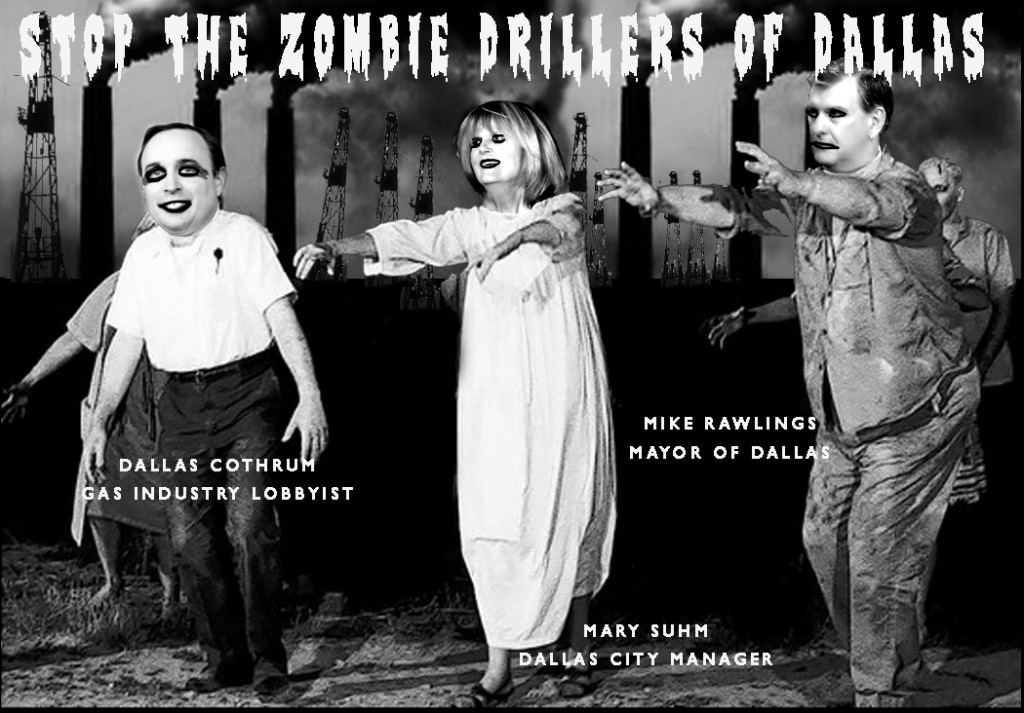 Because citizens unexpectedly won the rejection of Dallas drilling permits at December's City Plan Commission meeting, City Hall and the Gas Industry are trying to engineer a "do-over vote" this Thursday.
Because citizens unexpectedly won the rejection of Dallas drilling permits at December's City Plan Commission meeting, City Hall and the Gas Industry are trying to engineer a "do-over vote" this Thursday.
They're trying to give dead gas permits a second chance, but if we nail down the coffin this time, it could be the last vote on old gas leases on public land in Dallas.
That's why we need you to be there. Please.
THIS THURSDAY
Beginning 1:30 PM
City Council Chambers
6th Floor, Dallas City Hall
Just last month Downwinders at Risk and other citizens groups held off the combined forces of Dallas City Hall and the gas industry only five days before Christmas.
The other side knew a lot of people wouldn't be able to attend a last-minute holiday meeting and they scheduled the first vote on gas permits in Dallas in two years to take advantage. They thought they would win.
But they thought wrong. Despite not being able to show up with the numbers we've previously enjoyed, citizens still carried the day with a 7-5 victory at the Dallas Plan Commission. The next stop was the City Council, or so we thought.
But the gas industry and City Hall has been scheming again.
They've called for a "reconsideration" of the December vote at this coming Thursday's City Plan Commission meeting – a "do-over vote" for the same gas permits that were denied in December.
Why? Because we won, and they can't tolerate that.
If the original December 20th Plan Commission 7-5 denial of the Trinity East gas permits stands, the City Council will need a 12 member "super-majority" to overturn that denial and award the permits.
Right now, the Mayor and City Manager can't find 12 votes to approve gas drilling in parks and floodplains.
If they can't find them, then these permits are never awarded and the last of the "grandfathered" Dallas gas leases on public land are nailed shut and buried forever for lack of Council support.
On the other hand, if this "reconsideration vote" wins, and the Plan Commission approves the gas permits on a second try, then the Mayor only needs 8 votes to approve the permit when it comes to the Council. These zombie gas permits mught live to threaten Dallas for years to come.
The Mayor thinks he has 8 council votes for approval – at least until the May elections. But he doesn't have 12.
So if you want to quit coming to City Hall for these kinds of votes for a while, we strongly advise you make this one. It's a proxy vote for the entire gas drilling issue with this council.
A Quick Reminder of Some of What's at Stake:
1) Trinity East and City Hall staff are asking the City Plan Commission to vote in favor of allowing drilling on public parkland – something that is currently not allowed.
2) Trinity East and City Hall staff are asking the City Plan Commission to allow drilling in the Trinity River floodplain – something that is currently not allowed.
3) One of drilling sites is in the middle of the newly-rechristened "Luna Vista" (LB Houston) Golf Course and by the North Hills Prep School.
4) At another site near the city's large new Elm Folk soccer complex, Trinity East and City Hall staff are supporting the construction of three gas compressors that could EACH release 25 to 300 tons of air pollution a year without any public notice. This air pollution includes carcinogens such as Benzene and Formaldehyde, as well as smog-forming pollution and greenhouse gases. That's 75 to 900 tons a year total, or 150,000 to 2 million pounds, of potential air pollution from just one proposed site every year. That's huge.
Please do three things to help:
1) Send a "Don't Approve These Gas Permits" message to the Plan Commission and City Council right now.
We've set up a "click and send" e-mail message you can automatically send to members of the Dallas City Plan Commission and City Council through our own website at:
https://www.downwindersatrisk.org/featured-citizen-action
You can send our prepared comments as well as your own. But please do this right now – the vote is this Thursday and they need to see their mailboxes full this week. And please do this even if you did it for the first Plan Commission vote back in December.
2) Show Up on Thursday
90% of social change is just showing up. We know it's a hassle. But if you can take off work, if you can arrange for someone else to pick up the kids, if you can put off those errands another day, we really do need your warm body in a seat at City Hall to help us prevent this backdoor attempt to subvert democracy. Really. At meetings like these, think of the room as one big ballot box. Each seat represents a vote. A ballot. When you sit down, you become a breathing, warm-blooded ballot for change. We need to stuff the ballot box this Thursday.
We encourage non-Dallas residents who have experiences with gas facilities they want to share to come and testify. Trinity East lobbyists love to talk about how great these facilities are elsewhere in North Texas.
It starts Thursday at 1:30 pm in the Council Chambers on the 6th floor of Dallas City Hall. The Trinity East gas permits may get moved up on the agenda or they may be the last item for action that day. Be prepared to stay. We want you to speak out and make comments, but you don't have to. Just be there.
3) Register to Vote
Dallas City elections are this May. Many City Council supporters of gas drilling are now officially running for re-election. These council members, and their opponents, need to know how you feel about their support of irresponsible urban drilling. The Mayor thinks he still has 8 votes for drilling in floodplains and parkland with these incumbents. That number could be lower by June.
Let's be clear: Nothing has changed between December 20th and now to warrant a "reconsideration" of the original City Plan Commission vote to deny Trinity East's gas permits, except the desperation of the opposition. This is just a raw power play.
Trinity East and City Hall are mad at us because citizens are getting in the way of a "deal" that's already been "cut" between gas operators and City Hall. We're imposing messy transparency and common sense on a backroom "business arrangement" that the public was excluded from when it was made.
We won the first round without many of you there. Now, we need everyone's help to defend that victory. Show up on Thursday to help us throw another public monkey wrench into their private deal-making. Don't let them steal this vote. Thanks.
See you Thursday.
Call to Action: First Vote on Dallas Gas Permits in 3 Years Thursday
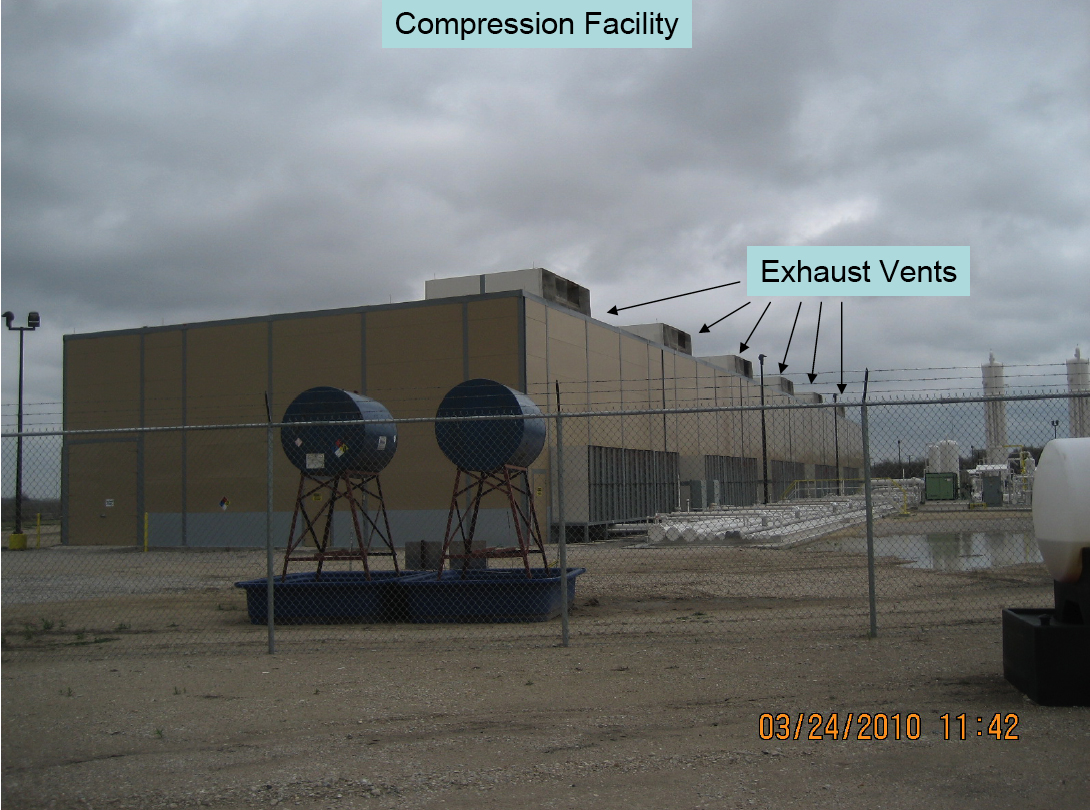 For the first time in three years, the City of Dallas will be officially acting to approve or disapprove gas drilling permits within its city limits. It happens this Thursday, December 20th at 1:30 pm in the City Council Chamber on the 6th floor of City Hall.
For the first time in three years, the City of Dallas will be officially acting to approve or disapprove gas drilling permits within its city limits. It happens this Thursday, December 20th at 1:30 pm in the City Council Chamber on the 6th floor of City Hall.
The three permits being sought by gas operators Trinity East authorize up to 20 wells each, for a total of 60 wells.
One of the permits is requesting a gas compressor station only 600 feet from a soccer complex.
The other two permits would allow gas drilling in city parks and in the Trinity River floodplain.
These are all bad ideas. Lois Finkelman, the Chair of the Dallas Gas Drilling Task Force advised the City to keep compressor stations out of town. The city currently doesn't allow drilling in the flood plain or on parkland. This vote roles all these bad ideas into one big Very Bad Idea.
Then there's the bad government part. Instead of the City Council adopting a new gas policy that covers all gas operators and then allowing permits to be issued under that policy, the Council is doing it backwards. It's issuing permits for specific sites before the broader, more comprehensive policy is in place. Since drilling in the flood plain and city parkland isn't allowed under current law, the Plan Commission is being asked to approve permits that violates city regulations, with the expectation that the Council will then make these prohibited activities legal. The Council is asking the Plan Commission to do its dirty work for it. It should decline the offer.
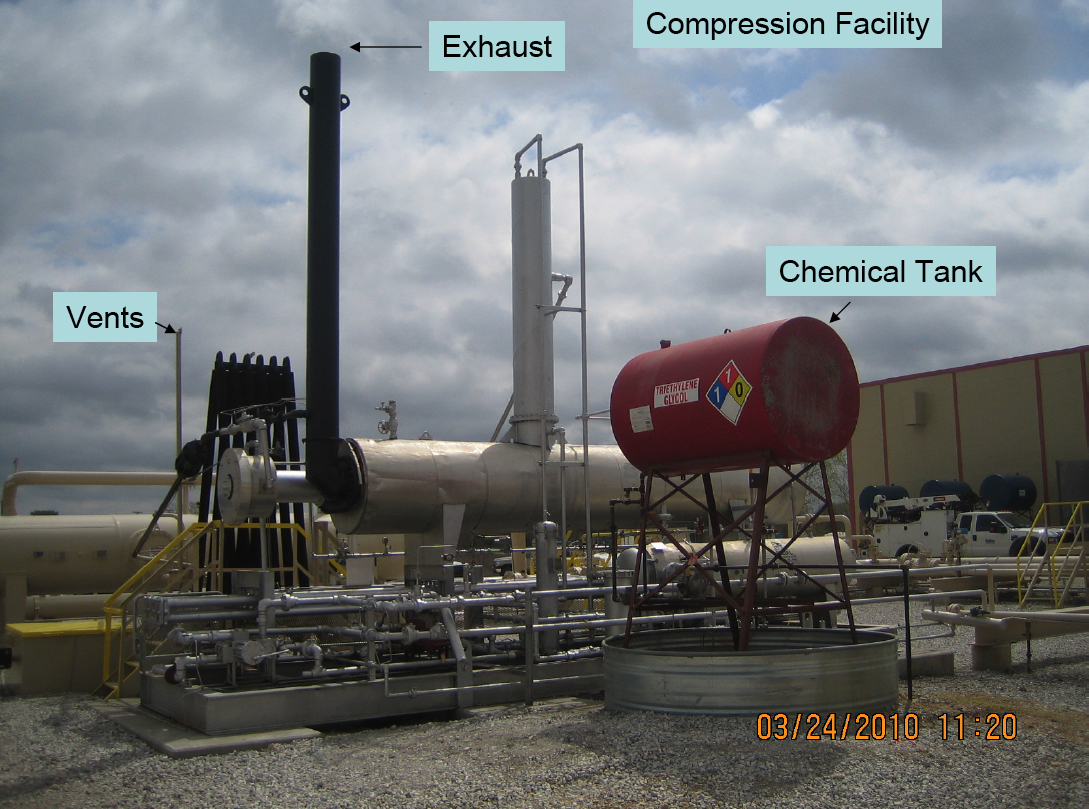 Compressor stations are the cement plants of the gas cycle. In fact, some of their emissions are larger than those of a cement plant. Only instead of 300 foot stacks, the pollution comes out 20 feet above ground level. Unlike a gas drilling rig, these facilities run 24/7. By Standard Permit compressors are allowed to emit up to 25 tons of Volatile Organic Compounds like Benzene and Formaldehyde, both carcinogens, 25 tons of Sulfur Dioxide, a respiratory irritant, and 250 tons of smog-forming Nitrogen Oxide. They're also some of the largest sources of Greenhouse Gas pollution in North Texas. Compressors are large industrial operations that don't belong anywhere near people, much less a soccer field full of kids.
Compressor stations are the cement plants of the gas cycle. In fact, some of their emissions are larger than those of a cement plant. Only instead of 300 foot stacks, the pollution comes out 20 feet above ground level. Unlike a gas drilling rig, these facilities run 24/7. By Standard Permit compressors are allowed to emit up to 25 tons of Volatile Organic Compounds like Benzene and Formaldehyde, both carcinogens, 25 tons of Sulfur Dioxide, a respiratory irritant, and 250 tons of smog-forming Nitrogen Oxide. They're also some of the largest sources of Greenhouse Gas pollution in North Texas. Compressors are large industrial operations that don't belong anywhere near people, much less a soccer field full of kids.
Opening the door to drilling on city parkland and in the floodplain sends the wrong message at the wrong time. This allows green space to be permanently removed for industrial use. It creates flooding hazards. It sets s a terrible precedent that will come back to haunt Dallas.
The Powers that Be hope that by scheduling it so close to Christmas, this vote, which brings to an end a three year moratorium on such gas permit requests, will be under your radar. Please show them they're wrong. We know it's a pain to have to deal with this right now, but we don't have any choice.
For three years, we've managed to hold off the rush to drill in Dallas. Time and again you've helped us do so by showing up at critical points in the process. This is the most critical one so far.
And once again, only a strong public showing of opposition from you and other supporters of a sane public health and environmental policy can prevent this Very Bad Idea from becoming reality. Please be there at City Hall at 1:30 pm on Thursday or show up as soon as you can. We wouldn't be asking for your help at this busy time of year unless we really needed you to be there for this one.
Meanwhile, our friends at the Texas Campaign for the Environment have just set up an easy way to e-mail members of the City Plan Commission with prepared comments or ones of your own making at this site: http://www.texasenvironment.org/dsp_TargetTemplate_choices.cfm?TTID=39
Please send comments in between now and Thursday at 12 noon to have an impact. Thanks very much for your support. If enough of us show up, we can do it again.
Jim Schermbeck, Downwinders at Risk
Good Friday: Exide Smelter Closing Today
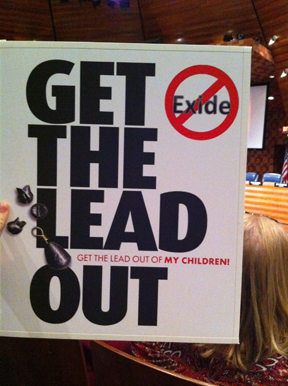 Sometimes, all it takes is the slightest push of an index finger, or a focused exhaling of breath.
Sometimes, all it takes is the slightest push of an index finger, or a focused exhaling of breath.
Sometimes the house of cards is so precarious, so unstable, that any challenge, no matter how slight, can send the established structure to the ground.
A year ago a small, newly-formed citizens group that had just staged its first action was struggling to convince the City of Frisco to quit supporting co-existence with an outlaw lead smelter and instead kick it out of town.
Today, that smelter will stop operating.
Community activism rarely pays off as quickly or as spectacularly as it has with the curious case of the Exide lead smelter. But when it does, it's reason to pause and give thanks and remind ourselves that such things are still possible.
Because truth be told, this historic effort was directed by a group of Frisco residents that was never larger than 10 people strong. Please just think about that. Less than a dozen people challenging their local status quo are responsible for this huge victory for public health.
Downwinders' often tells its supporters that, like the Woody Allen quote about life, 90% of social change is about just showing up. The system so often goes completely unchallenged, that you'd often be surprised what happens when you just show up and start asking embarrassing questions. When you start poking at the house of cards.
As their campaign proceeded, this small group of committed people attracted the support of hundreds, and then thousands of their fellow residents. They forced the city to see the contradiction between the continued operation of a circa-1960's smelter and the reality of 2012 Frisco. They held up a mirror and re-framed the relationship between smelter and town. And the contradiction was so great, so at odds with the new perception of Frisco, that the established political support the smelter had enjoyed in town for decades dried up. Young couples with kids concerned about a lead smelter they never heard of before outnumbered Good Ol Boys in City Hall and the Chamber of Commerce. The old establishment was undone by the very demographics of change they'd unleashed a decade or so earlier.
There is still much work to do. A half-century of contamination blankets the smelter site, as well as an undetermined number of off-site "hotspots." Exide wants to leave a permanent landfill behind in the middle of Central Frisco, while the City is breezing along with plans to turn a piece of land right across the street from the smelter site into the city's largest park. Downwinders will be helping citizens monitor the cleaning-up of the smelter site for at least the next two years.
But as of today there is no more lead pollution coming out of the Exide smokestacks. No more daily fallout of poison. No more new layers of lead being laid down in the topsoil of Frisco. That is a pretty remarkable thing considering where we were 365 days ago.
So raise your glasses tonight to the hardy folks of Frisco Unleaded and the improbability of the impossible happening in record time. Here's to Colette McCadden, Henrik Ax, Shiby Matthew, Matt Vonderahe, Jeannette Sandin, Meghan Green, and Eileen Canavan, all residents who decided they would stick their neck out and start showing up and asking questions, much to the consternation of the Powers That Be. May they all have Frisco parks, and schools, and streets named after them.
It's not always this easy, but the fact that it was this time should give us hope about the power of pushing back.
The Environmental Agenda of a Second-Term Obama Administration
 Yeah, we don't know what it is either. We suspect not even Lisa Jackson knows. But of course, that doesn't keep the chattering class from speculating about what will or won't happen in the next four years on the energy and environment front. So without further ado….
Yeah, we don't know what it is either. We suspect not even Lisa Jackson knows. But of course, that doesn't keep the chattering class from speculating about what will or won't happen in the next four years on the energy and environment front. So without further ado….
Here's a pretty banal piece from the Hearst Chain that includes the premise the president is free "to approve natural gas exports and the controversial Keystone XL pipeline without fear of alienating environmentalists he needed at the ballot box."
Ah, but here's a piece from USA Today that quotes heavily from Romney supporters in industry to suggest the president will reject the pipeline and propose a slew of anti-oil and gas regulations.
Then there's this much longer and better Bloomberg piece that actually focuses on EPA rules already in the, er, pipeline, such as new lower Particulate Matter ambient air standards, the possibility of the lower ozone standard Jackson was originally going to propose before she got mugged by the White House re-election campaign, and new greenhouse gases limits for power plants.
It also mentions the possibility – brought up by industry lobbyist and Dallas native Scott Segal, no less – of a carbon tax as part of a solution to the "fiscal cliff" now getting so much post-election coverage, and talks about whether Lisa Jackson is staying or going.
Liberal thinktankers at Think Progress just posted this article advocating the "Five Essential" environmental rules that should be the focus of Obama's second term.
Finally, not mentioned in any article so far, but on the minds of kilnheads across the country, is the fate of the inane proposed revisions in cement plant emissions rules that were the subject of an August EPA national hearing at the Arlington City Hall that many of you attended. A final decision on those is due by December.
